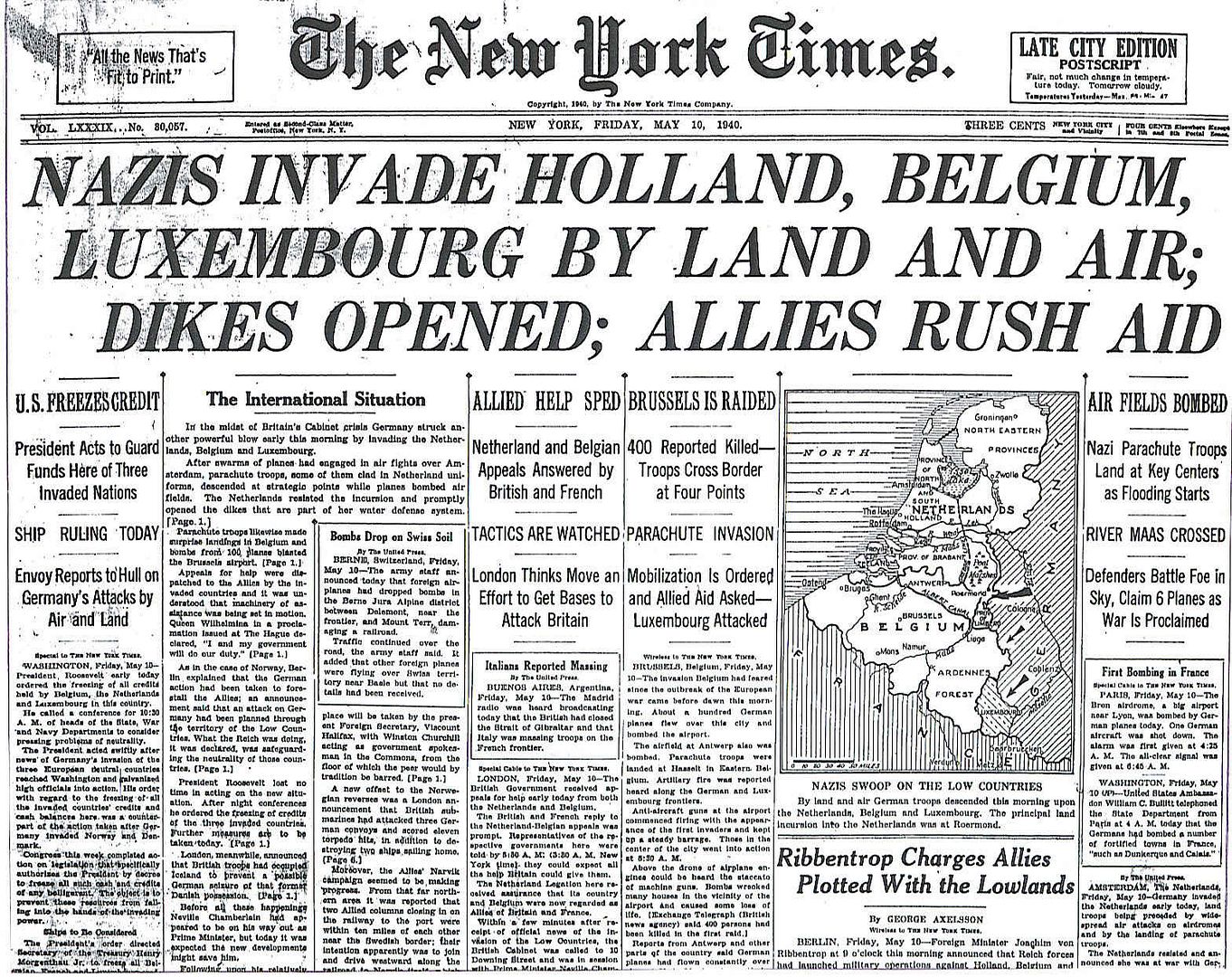
Posted on 05/10/2010 4:38:18 AM PDT by Homer_J_Simpson

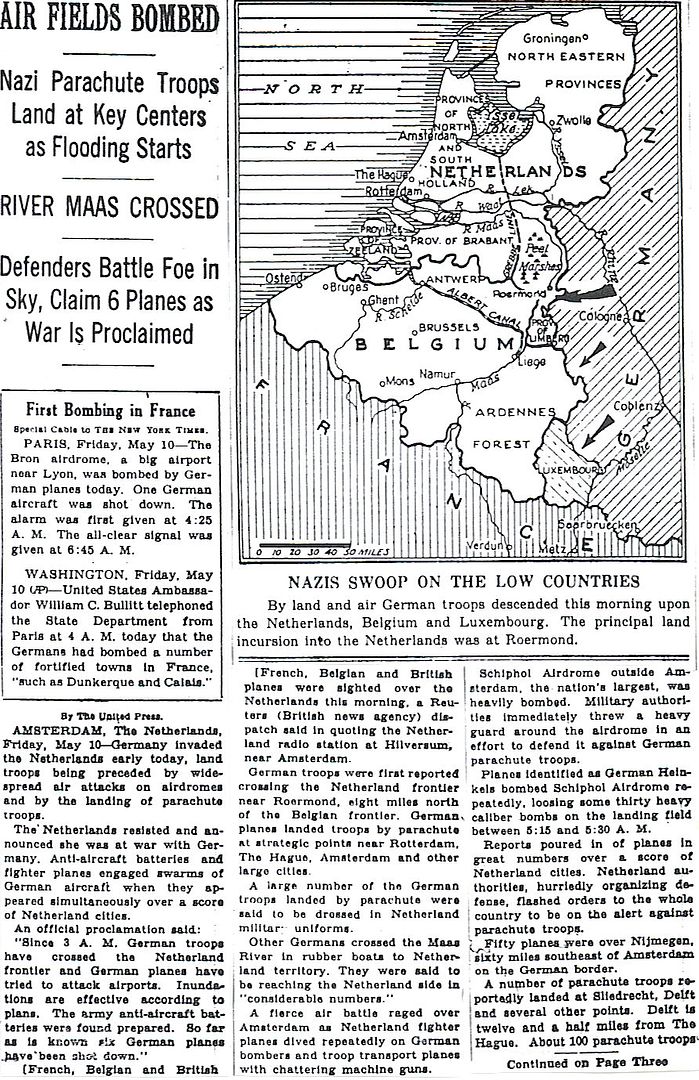
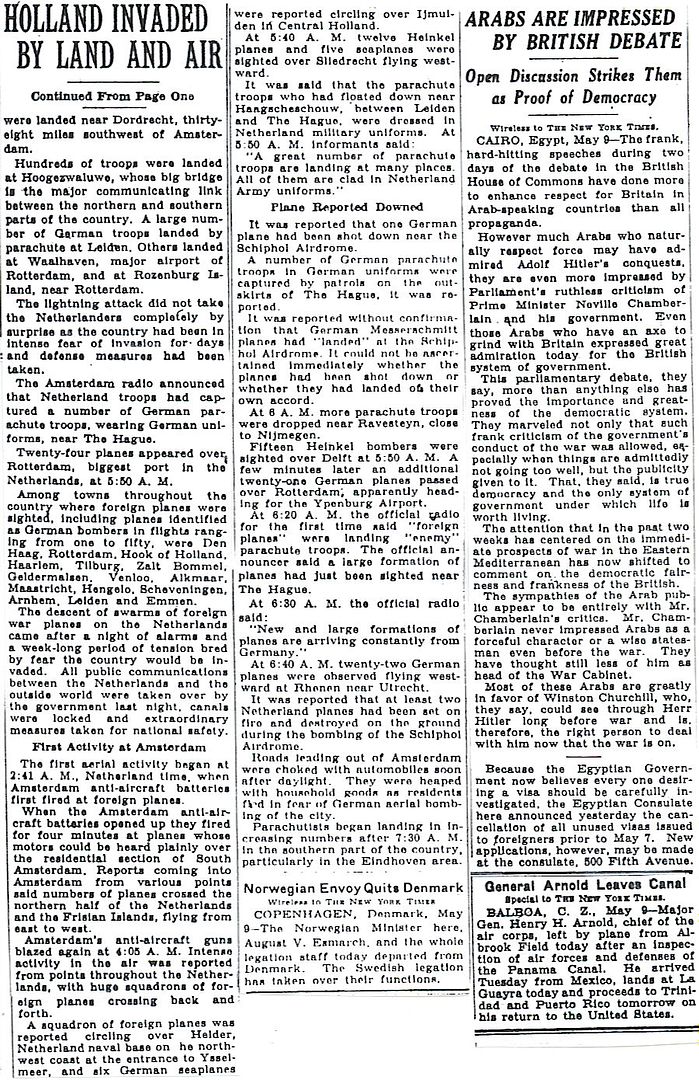
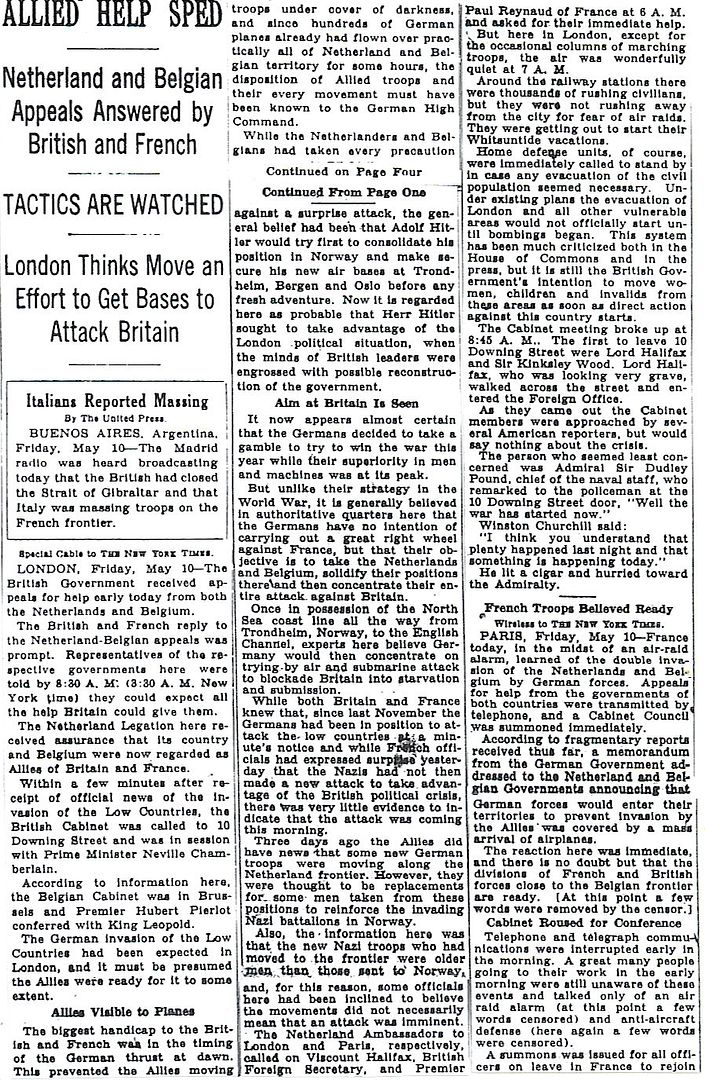
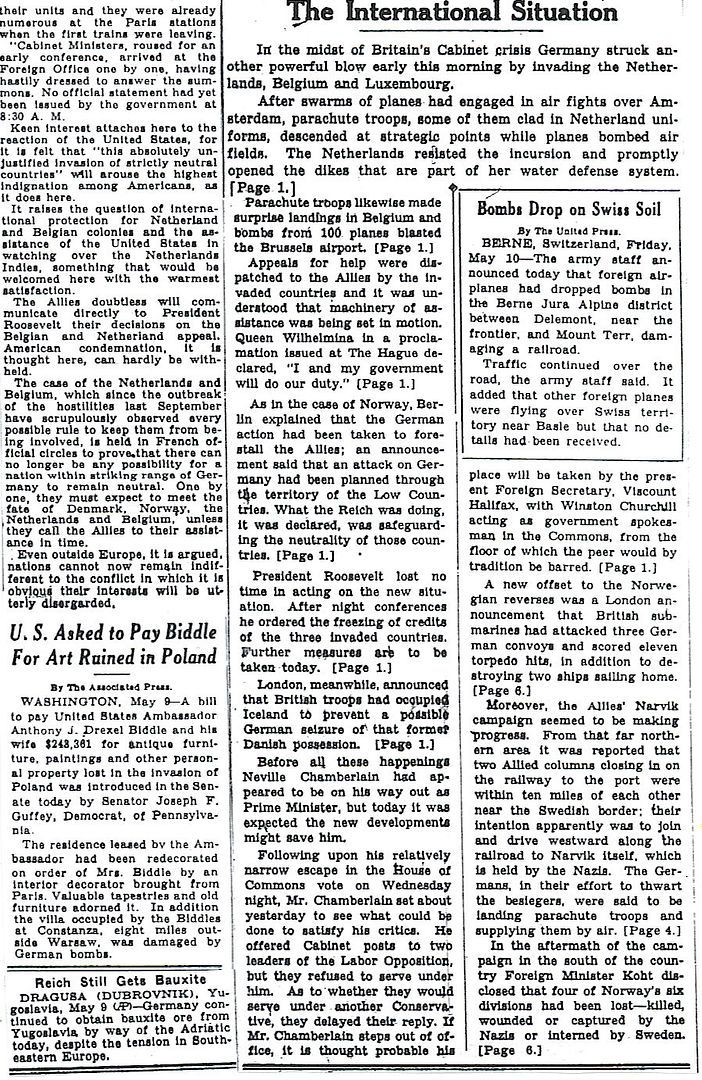
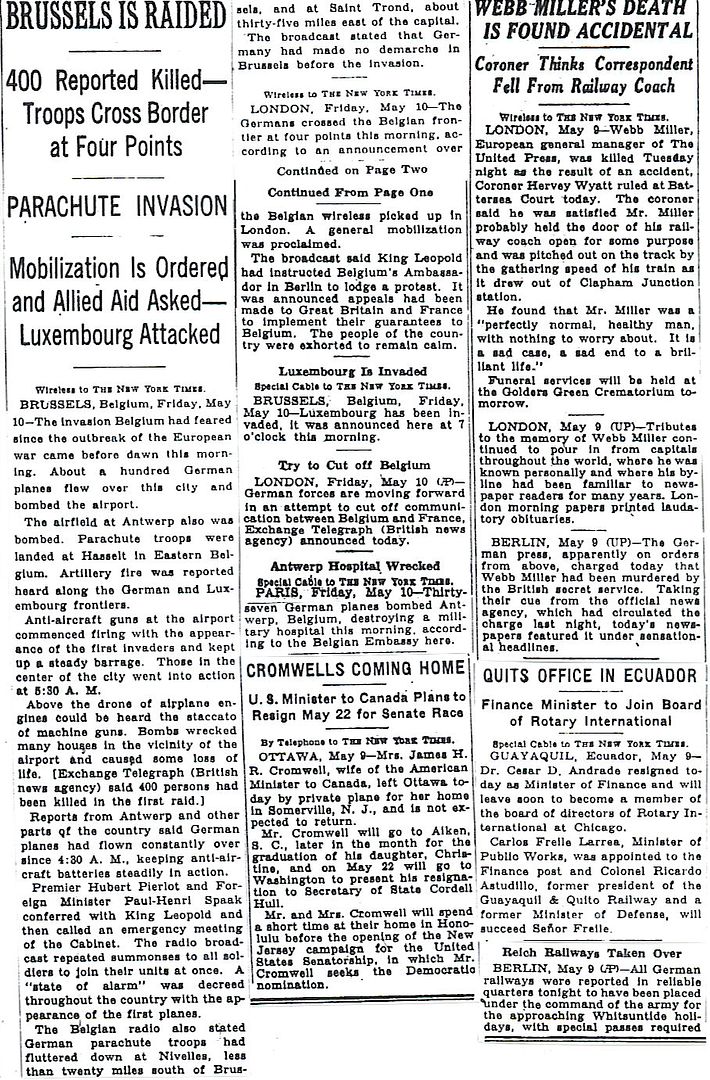
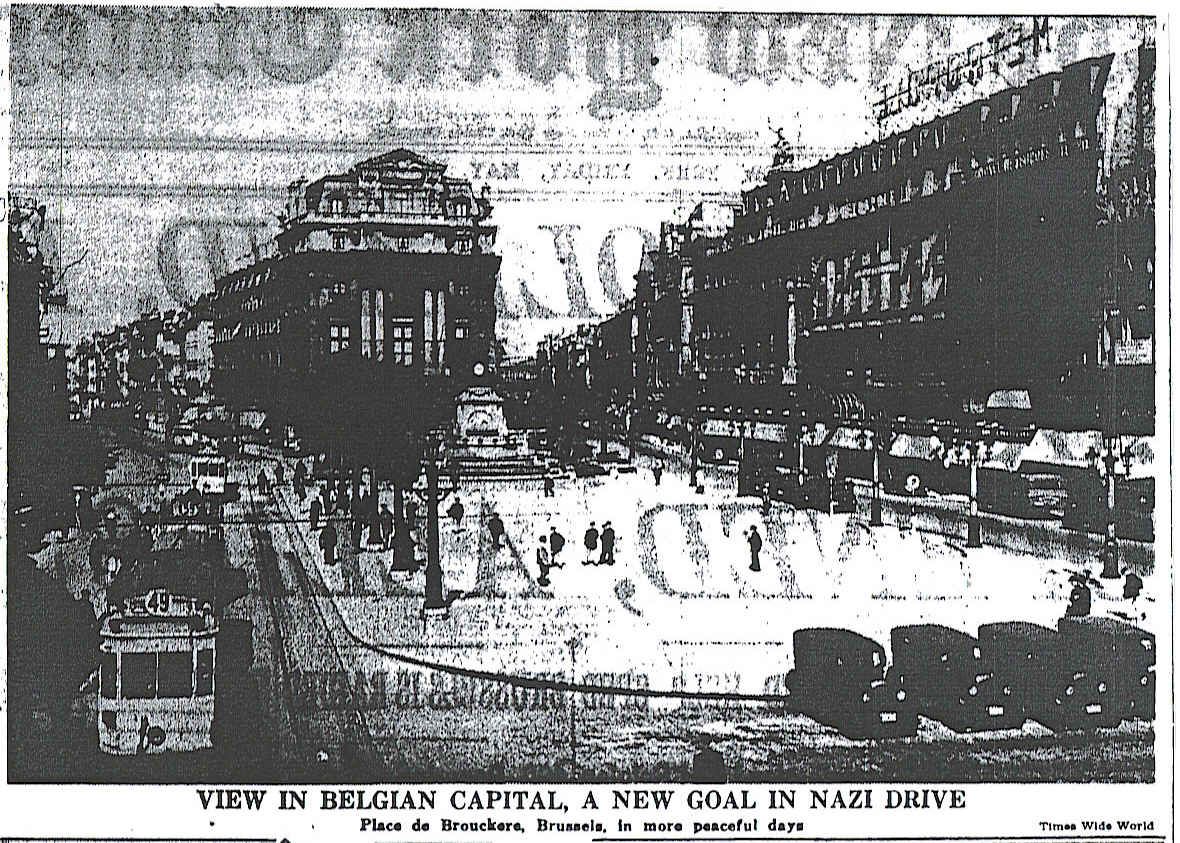
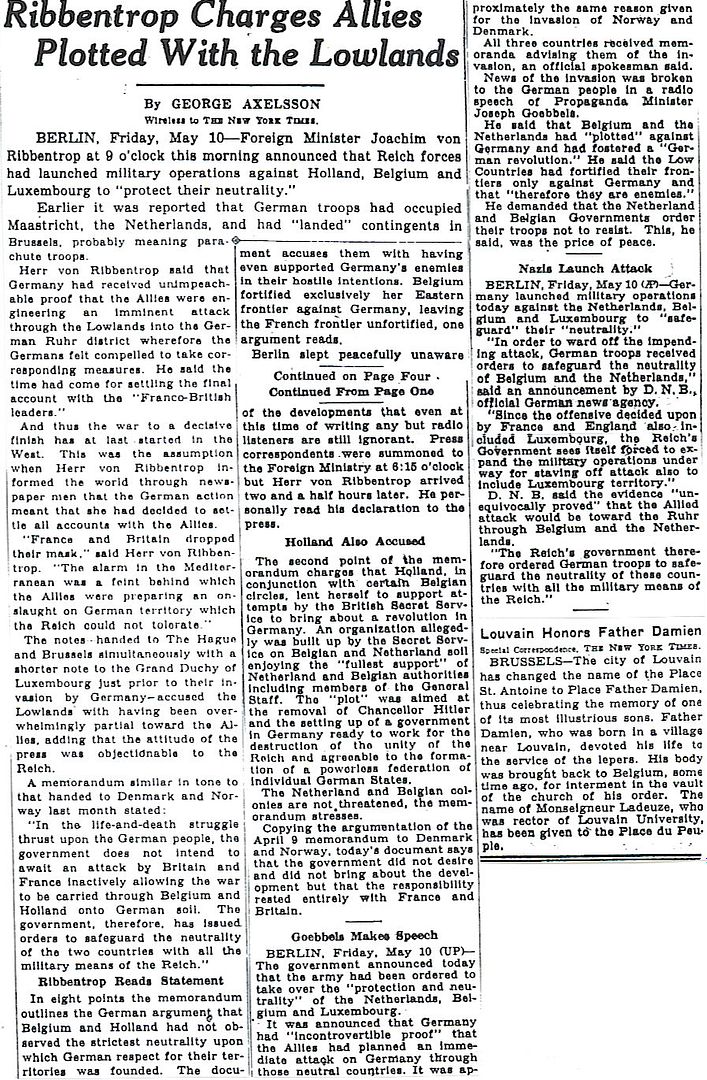
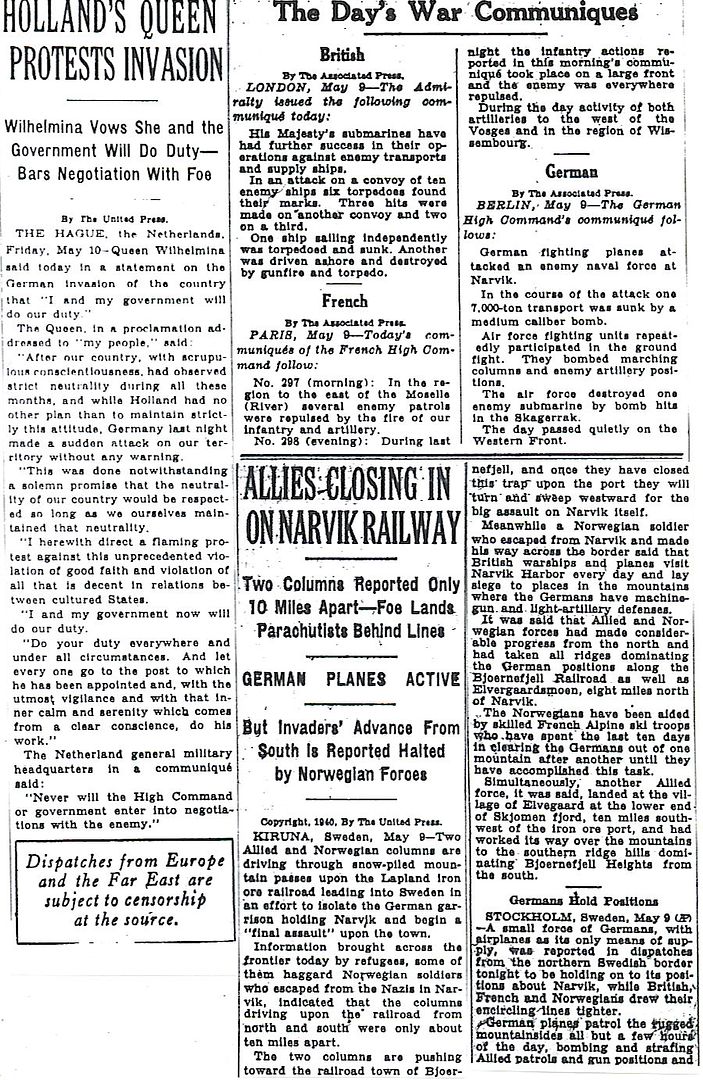
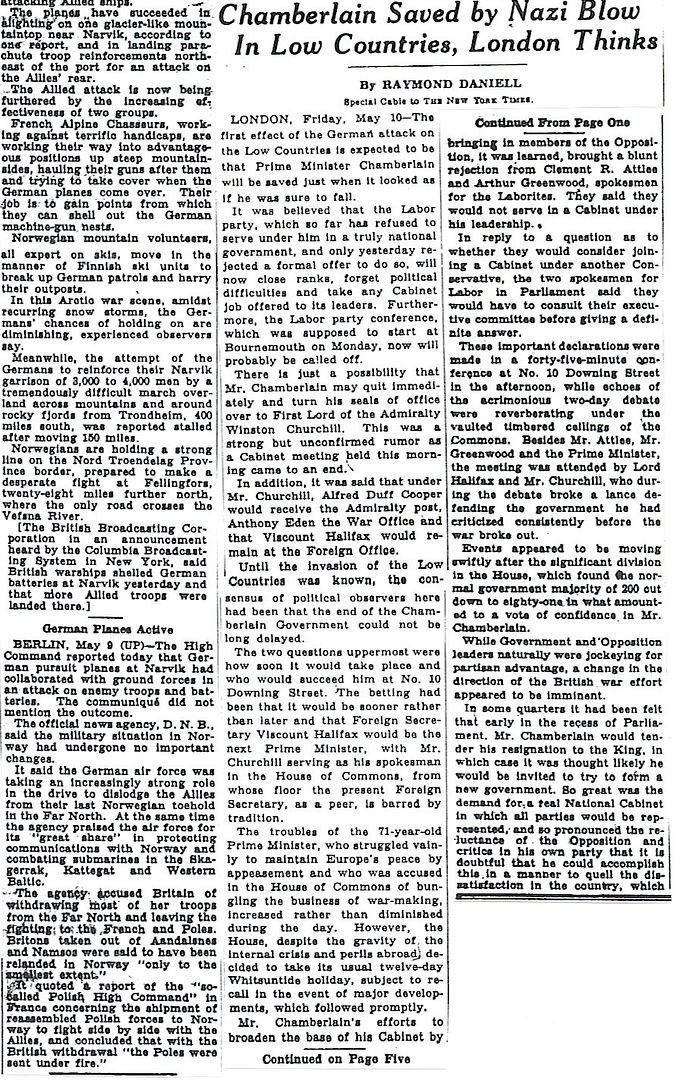
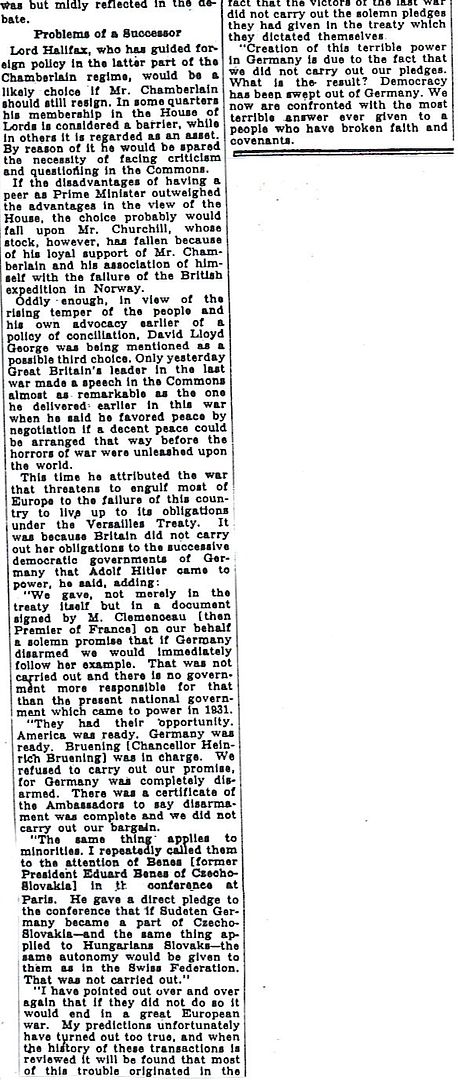
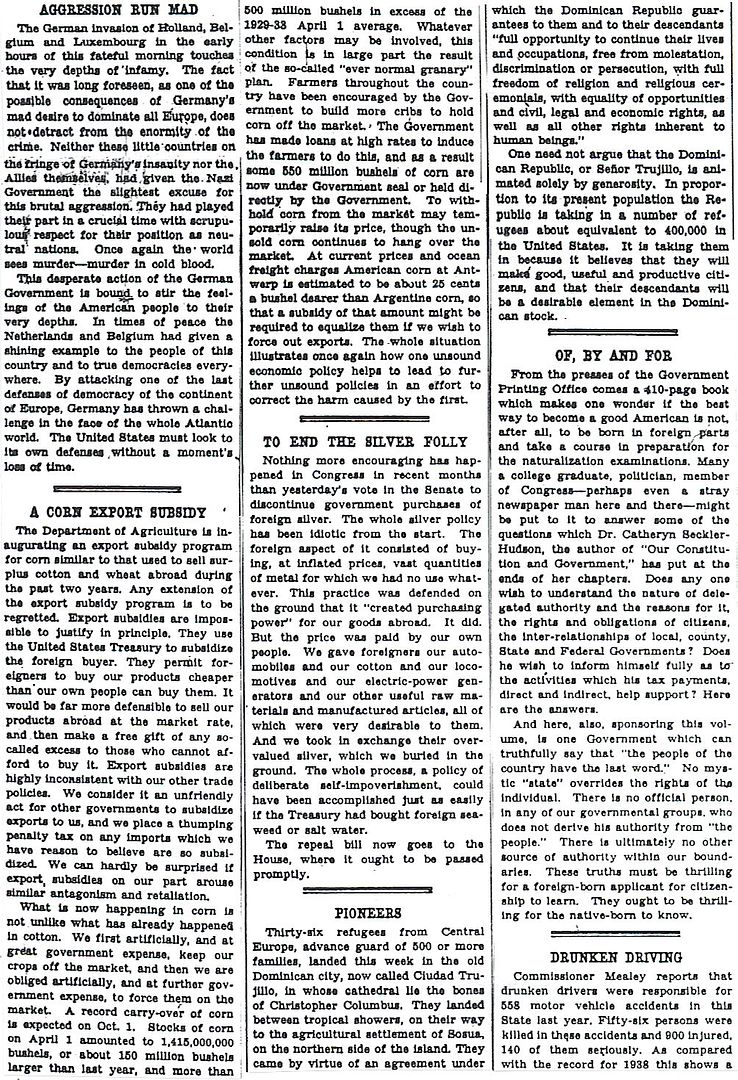
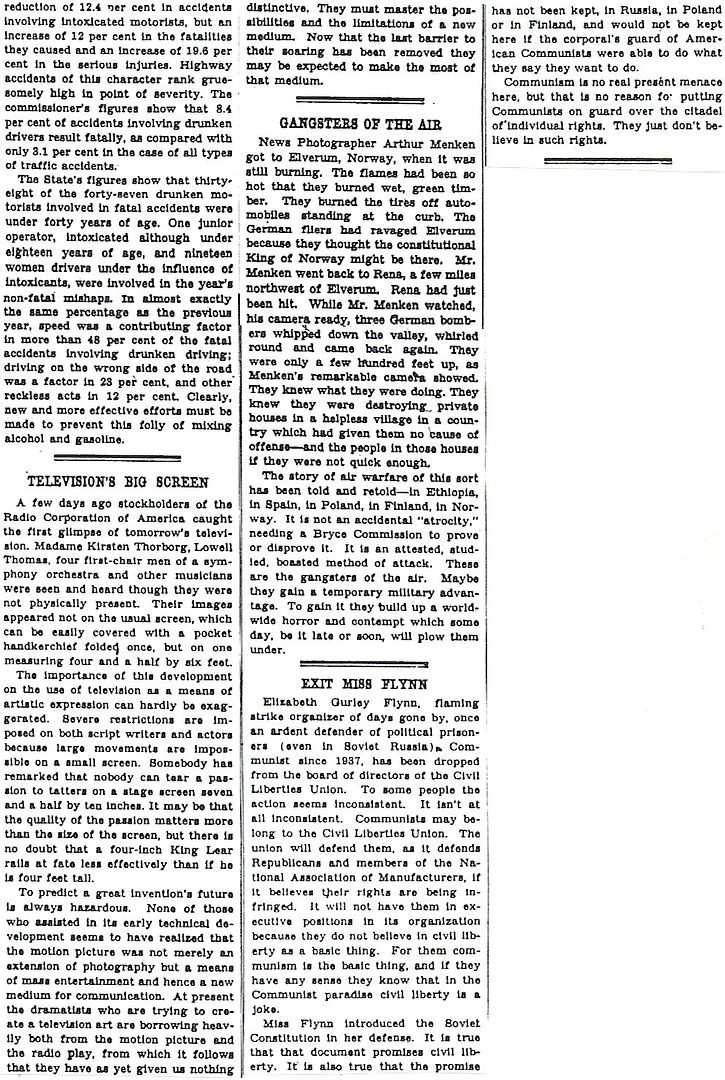
Editorials – 12-13
Aggression Run Mad
A Corn Export Subsidy
To End the Silver Folly
Pioneers
Of, By and For
Drunken Driving
Television’s Big Screen
Gangsters of the Air
Exit Miss Flynn
Not to worry...the Allies will have no trouble moving into Belgium to stop the “main” German attack. /s
http://en.wikipedia.org/wiki/Louisiana_Maneuvers
The Louisiana Maneuvers were a series of military exercises held all over North Louisiana, including Fort Polk, Camp Claiborne and Camp Livingston, in August and September 1941. The exercise was designed to test US troop training, logistics, doctrine, and commanders.
http://www.onwar.com/chrono/1940/may40/f10may40.htm
Blitzkrieg in the west
Friday, May 10, 1940 www.onwar.com
German paratroopers drop in HollandOn the Western Front... The Germans launch Operation Gelb, the offensive in the west. Army Group C (Leeb) holds the German frontier opposite the French Maginot Line while Army Group A (Rundstedt) makes the main attack through the Ardennes and Army Group B (Bock) makes a secondary advance through Belgium and Holland to draw the main British and French forces north. During the day, Army Group A strikes, with three armored corps in the lead, heading for Sedan, Montherme and Dinant. The advance is rapid and the little opposition, mostly French cavalry, is thrown aside. To the north, Army Group B carries out parachute landings deep inside Holland which do much to paralyze Dutch resistance, while German units cross the Maas River near Arnhem and the Belgian fort at Eben Emael is put out of action by a German airborne force which lands its gliders literally on top of it. The fort is meant to cover the crossings of the Albert Canal nearby and this is not achieved. The Luftwaffe gives powerful support. At the end of the day the German advance has gone almost exactly according to plan. Meanwhile, the Allied Plan D provides for the French 1st Army Group ( General Billotte), consisting of the British Expeditionary Force ( General Lord Gort) and the French 7th Army (General Giraud) to advance to the line of the Dyle River and the Meuse River above Namur, to be joined there by the Belgian forces and on the left to link with the Dutch. General Gamelin is the Allied Supreme Commander and General Georges commands the armies on the French Northeast Front. The Allies react quickly to the German attacks as soon as they hear of them from the Belgians. By the evening much of the Dyle line has been occupied but the troops find that there are no fortifications to compare with the positions they have prepared along the Franco-Belgian frontier during the Phony War period. Some of the reserve is therefore committed to strengthen the line. Some of the advance forces of French 7th Army make contact with the Germans in southern Holland and are roughly handled.
In Britain...Churchill visits the King and officially takes office as prime minister.
In Norway... British forces are sent south from Harstad to Mo-i-Rana to join the small units trying to delay the German advance to relieve the Narvik force. Some of these units are now engaged at Mosjoen.
In Iceland... British troops land on the island. They are the advance elements of a force which is to set up a destroyer and scout-plane base to help in the convoy battles in the Atlantic. Equally, they will prevent the Germans using the island to aid their U-boat campaign.
http://homepage.ntlworld.com/andrew.etherington/month/thismonth/10.htm
May 10th, 1940
UNITED KINGDOM: At 4:30 P.M. The prime minister, Neville Chamberlain, began the War Cabinet’s third meeting of the day. He has considered surrendering his seals of office to the King because there is a need to form a coalition government. He described the military situation to the War Cabinet. During the meeting he was handed a message that the only person with whom Labour will serve as the prime minister in a coalition government is Winston Churchill, now First Lord of the Admiralty. He continued with his agenda describing the deteriorating situation on the continent. At the end of the meeting he read the message describing Labour’s position. Within a half hour he is on his way to see the King and tender his resignation. He told the King of Labour’s position whereupon the King sent for Churchill and asked him to form a government. Churchill accepted. (Jay Stone)
London: Neville Chamberlain, who resigned as Prime Minister two days ago, tonight advised the King to send for Winston Churchill to form a new government. Mr. Churchill, who has emerged as the most credible candidate to lead the war effort, was immediately summoned to the Palace. He told the King that he will build an all-party team to achieve ultimate war victory. In addition to being Prime Minister, Mr. Churchill will act as Minister for Defence. He will have a small war cabinet. Mr. Attlee and Mr. Arthur Greenwood, the leader and deputy leader of the Labour Party, were at Admiralty House late tonight. It is understood that the new premier discussed the allocation of posts with them. Some trade union leaders will be brought into the government.
Mr Chamberlain had hoped to remain in office in spite of his humiliation in the House of Commons on the 8th. His decision to quit came only after Mr. Attlee told him that Labour’s National Executive had decided that the party should join a coalition only if there were a new Prime Minister. On getting this news Chamberlain called a special cabinet meeting and said he must resign In view of the swift deterioration of the war with Germany’s invasion of Holland, Belgium and Luxembourg.
Chamberlain broadcast to the nation this evening. He disclosed that Mr. Churchill has asked him to be a member of the new war cabinet; he has agreed. Chamberlain also said with a tremor in his voice: “As long as believed that there was a chance of preserving peace honourably I strove equally hard to wage it with all my might.”
RN: The admiralty initiates plans to withdraw shipping from the Low Countries, to block the main ports and demolish installations, and to remove gold and diamonds.
RAF Bomber Command: 4 Group (Whitley). Bombing - road/rail communications in Cleve area. 77 Sqn. 4 aircraft and 102 Sqn, bombed as briefed. Slight opposition.
At 4:30 P.M. The prime minister, Neville Chamberlain, began the War Cabinet’s third meeting of the day. He has considered surrendering his seals of office to the King because there is a need to form a coalition government. He described the military situation to the War Cabinet. During the meeting he was handed a message that the only person with whom Labour will serve as the prime minister in a coalition government is Winston Churchill, now First Lord of the Admiralty. He continued with his agenda describing the deteriorating situation on the continent. At the end of the meeting he read the message describing Labour’s position. Within a half hour he is on his way to see the King and tender his resignation. He told the King of Labour’s position whereupon the King sent for Churchill and asked him to form a government. Churchill accepted. (Jay Stone)
Boom defense vessel HMS Barcliff launched.
Submarine HMS Tuna launched. (Dave Shirlaw)
Western Front.
The German Operation “Case Yellow” begins. This is the attack against Holland, Belgium, Luxembourg and France. The Germans field 136 Divisions against the Allies with 149 Divisions. The Germans have a superiority in its unified command structure, air craft and surprise.
MAP
BELGIUM:
The first bombs drop on Belgian and Dutch targets at 3.30 am.
The French ‘Havas News Agency’ reported:
German troops have crossed the border into Belgium. Battles are being fought along the Belgium-German border. Evers airfield at Brussels has been bombed by the Germans. Belgium has asked France and England for help.
The Germans have captured the supposedly impregnable fortress of Eben Emael in a daring coup de main operation. The guns of this fort, situated between Maastricht and Liege, threatened the advance of the German 6th Army into Belgium, so it had to be captured; but its massive concrete walls and other defences presented a problem. The Germans built a replica and, after months of study, came up with the perfect solution.
At dawn 42 gliders, towed by Ju52 transports, flew over the Belgian border. The bulk of the force seized nearby bridges, but ten gliders landed on top of the fort of Eben Emael itself. 78 parachute engineers jumped out and immediately attacked the gun emplacements from above, whereas its defenders were prepared for assaults from below. To overcome the thick concrete they used specially designed hollow charges. The guns were quickly destroyed. The totally surprised 1,100 man garrison has withdrawn to the complex network of passages and chambers under the fort, and efforts continue to winkle it out; but the way ahead for the German army is now clear.
Allied troops began crossing into Belgium soon after 7 am today, but the deployment has been erratic. When French troops arrived by rail at the Belgian border there were no Belgian locomotives to haul them. Also, the Belgians had failed to remove the frontier roadblocks and the French were held up for an hour or more on demolition work. The British 3rd Division commanded by Major-General Bernard Law Montgomery was held up by a Belgian officer who demanded to see a permit for the British to enter. Finally the British rammed their way through with heavy trucks and crossed at 2.30 pm. Still by midnight Allied cavalry and light armoured divisions had reached the planned defensive line running east of Brussels down to the Namur in the south.
With 30 French divisions, nine British and the bulk of the 22 Belgian, the Allied are greatly superior to the 30 German divisions on this front, though the Luftwaffe is poised to seize air supremacy. The Germans believe, however, that the Allies have walked into a trap without realising it, “I could weep for joy,” Hitler cried when he heard of the Allied advance.
RAF Fairey Battles of No. 12 Squadron attack the Maastricht bridges. For there bravery in this operation, F./O.D.E. Garland and Sgt. T. Gray were posthumously awarded the V.C., the first to be awarded to members of the RAF in WW2. Garland’s Battle was P 2204.
The Belgian Army has 24 infantry divisions. Their dispositions were: a defensive covering position along the Albert Canal and the Meuse, supported by strongholds at Antwerp, Liege and Namur, which absorbed 10 divisions plus another 2 as a forward element on the frontier canals and 2 divisions in Belgian Luxembourg. Next there was an intermediate position on the Gette (1 division) as a collecting point for the troops withdrawing from the covering position. Lastly, there was a permanent defence line between Antwerp and Namur, of which the Belgians were only to hold the left sector, Antwerp-Louvain, initially with 1 division. It was hoped the rest would be occupied by the Allies. The other divisions were in reserve. Thus the greater part of the Belgian Army was on the Albert Canal.
German parachutists have landed at The Hague and Rotterdam. Another group of parachutists and gliders landed near Maastricht, attacked the Eben-Emael fort and seized the bridges of Vroenhoven and Veldwezelt on the Albert Canal. Thus the Canal defence line was already in danger of having its east flank turned.
NETHERLANDS:
Allied naval demolition parties land at Dutch ports, evacuate ships, tugs and barges and destroy oil stores.
Queen Wilhelmina makes “a flaming protest against this unprecedented violation of good faith.”
Dutch Army Headquarters announced:
German troops began to march into Holland at 3:00 A.M. Assaults have been launched against several airfields. Our army and anti-aircraft defences are ready for action. Flooding to obstruct the German advance, is proceeding according to schedule. At least 6 German aircraft have been shot down so far.
Hilversum: ‘Havas’ reports: Dutch radio has made an appeal to the population, in which it reported that German parachutists have landed in the Netherlands, some of them wearing Allied and Dutch uniforms. The Dutch people are urged to exercise extreme caution and vigilance.
The first German bombing assaults have decimated the small air forces of Belgium and Holland. However, according to British and French sources, the Luftwaffe destroyed only 45 French and 15 British aircraft on the ground on this first day. Throughout the day French and British aircraft have supported the advance of Allied ground troops in Belgium, and the French fighter force has shot down 90 German aircraft for the loss of only 20. The Luftwaffe today has borne the heaviest losses ever suffered by any air force on a single day: 304 machines destroyed, 51 damaged and 267 flying personnel dead.
Two thousand German parachutists (Fallschirmjäger) are dropped into Holland. They are from General Student’s 7th Airborne Division which is combined with the 22nd Airlanding Division consisting of the 16th, 47th and 65th Infantry Regiments under the command of General von Sponeck. This unit is under the command of Kesselrings Luftlotte.2. All plans for these operations have been put together by Student and his staff. Kesselring is overall commander of air operations in the Low Countries.
Their objectives are airfields and bridges. The parachute drops are to be backed up by the 22nd Airlanding who are to capture The Hague and with it the Dutch command and Royal Family.
General Student and his Chief of Operations Major Heinrich Trettner have landed today.
The specific Fallschirmjäger objectives are the Dordrecht and Moerdijk bridges assigned to the 1st and 2nd Battalions, 1st Regiment, under the command of Hauptmann Erich Walther and Hauptmann Prager. The airfield at Waalhaven is assigned to the 3rd Battalion, 1st Regiment under the command of Hauptmann Karl-Lothar Schulz and the Airfields at Valkenburg, Ypenburg and Ockenburg are assigned to the 1st Battalion, 2nd Regiment under the command of Hauptmann Nosterand the 47th Infantry Regiment, part of the 22nd Airlanding Division.
The first shots were fired at the Waalhaven airfield; Hauptmann Schulz’s men had to secure the airfield quickly to enable the 65th and 16th Infantry Regiments to land safely. The Luftwaffe had bombed the airfield but the Heinkels came under fire from AA guns and Dutch fighter aircraft and suffered several casualties. Waalhaven would have to be taken by paratroops. As the 3rd Battalion jumped they were met with stiff resistance, but most of them managed to land unscathed near the edge of the airfield. As the battle wore on the first of the JU-52 transports started to come into land with elements of the 22nd airlanding and the 2nd Battalion, 2nd Regiment aboard, attracting the now heavy artillery fire. Between them they eventually took the airport buildings and command of the airfield. They mopped up the remaining Dutch resistance and made the airfield safe for the rest of the 22nd Airlanding to fly in and reinforce.
The jumps on the 3 airfields at Valkenburg, Ypenburg and Ockenburg were planned in order to capture the Dutch Royal family and the Military High Command at the Hague. At Valkenburg Airfield the jump went well but on landing they found the runway surface unsuitable for the incoming JU-52 transports carrying the 47th Infantry Regiment. The Dutch then launched a series of counter attacks on the airfield.
At Ypenburg the Dutch had littered the airfield with debris to damage incoming aircraft, they also had strong AA defenses. Many JU-52’s were lost during the assault, those that were not shot down flew on to the airfield at Ockenburg, some even landed on the main road connecting Rotterdam to the Hague. The paras that did land at Ypenburg quickly found themselves surrounded by Dutch forces.
The situation was the same at Ockenburg where many JU-52’s had been destroyed in the air and on the ground, the men on the ground were encountering heavy resistance. The attack on the Hague was finally called off and all the forces involved were ordered to move out into the direction of Rotterdam. The Dutch forces hassled them all the way but the German forces managed to get their on the 12th - 13th May.” (Russ Folsom)
At Schipol Airport five KLM DC-2s and four DC-3s (all Fokker assembled aircraft) aircraft are bombed and destroyed.
More...
Destroyer HNLMS Van Galen served along her sister ships in the Netherlands East Indies until 1939, when she was ordered back to Holland. She arrived in Den Helder on May 8, only two days before the Germans attack. Two days later she was ordered to shell the German forces at the captured airfield Waalhaven near Rotterdam under fire. Before she could do so she was attacked by German aircraft and badly damaged. Nevertheless she made it to the Merwedehaven, where she finally sank. The ship was raised by the Germans on 23 October 1941, and being not worth repairing she was scrapped in Hendrik-Ido-Ambacht.
Submarines HNLMS O-21 and O-22 commissioned. (Dave Shirlaw)
FRANCE:
Vincennes - the Command Post of Gamelin:
1.00 am. the C-in-C learnt of a piece of information originating from the French Minister in Luxembourg which told of suspicious movements. At 1.30 am the confirmation arrived from Brussels. These two pieces of information were at once passed to General Georges (C-in-C of the French North-East front).
3.15 am. “Columns moving west,” announced French secret agents in the Rhineland.
5.05 am. the sirens at Vincennes start to wail.
5.20 am the Admiralty signalled that Calais and Dunkirk were being bombed; then that Holland was being invaded and that the French aerodromes in the north were being attacked. [This attack was not very successful. General d’Astier de la Vigerie wrote: “400 enemy planes took part in the attack [in No. 1 Army Group’s area]; 40 were shot down. On our side, of the 472 aircraft on the ground only 4 were destroyed and 30 were damaged, but repairable. the landing and taking off of our aircraft was never impeded.”]
5.30 am. General Georges gave the alert order to Billotte, commanding No. 1 Army Group.
6.30 Gamelin learnt that Belgium had asked France and Britain to intervene. He informed Georges by telephone (there was no radio at the C-in-C’s Command Post, they didn’t want to give their position away). “I suppose, mon general,” said Georges, “that this is a case for the Dyle Plan (the occupation of Belgium).” “As the Belgians are calling us,” answered the C-in-C, “do you see what else we can do?” “I certainly do not!.” A few minutes later Billotte received the order for the Dyle Plan. Soon after, he was informed that the 7th Army (General Giraud’s) had also received the order to move into Belgium and Holland for the “Breda alternative” of the plan.
Pivoting on the Givet, No. 1 Army Group (Billotte) was to swing to the Belgian part of the Meuse, between Givet and Namur and on to Antwerp; the last were fortified positions held by the Belgians.
On the extreme left of the Allies, the 7th Army (Giraud) was to make for Antwerp and then push on along the coast to link up with the “Dutch Fortress” on the line Breda -St. Leonard. The BEF was to take up positions along the Dyle river between Louvain and Wavre. The 1st Army (General Blanchard) was to block the “Gembloux Gap” between Wavre and Namur. South of Namur, and below the line of the Sambre-Meuse rivers, the 9th Army (General Corap) was to swing its left flank as far as the Belgian part of the Meuse, between Namur and Givet. Its right flank was already in place, on the French part of the Meuse between Givet and the junction of the Bar river. The 2nd Army (General Huntziger), the right hand army of No. 1 Army Group, was to remain in its positions along the Meuse and the Chiers, between Pont-a-Bar and the left of the Maginot Line.
GERMANY:
At 3 am Hitler’s train arrives at Euskirchen, near Aachen. Here in the darkened railroad station, a fleet of cars was waiting to take him and his staff to a command post situated on a heavily wooded mountain top near the village of Rodert. The command post had the code name ‘Felsennest,’ which means ‘eyrie on the cliffs.’ Hitler’s bunker had been blasted out of the rock, and all round the bunker, behind barbed wire and concrete fortifications, were wooden barracks and offices hidden in the forest.
The Wehrmacht High Command announced:
At 5.30 A.M. today, German troops crossed the borders of Holland, Luxembourg and Belgium. Enemy resistance near the border was broken everywhere by rigorous action, often with the closest co-operation of the Luftwaffe.
The Nazi newspaper Volkischer Beobachter reported:
Our mission is to attack and destroy flak positions at airfields in the zone of Rotterdam, The Hague and Delft. A pitch-black night swallows all preparations.
Takeoff has been ordered for 4:30 A.M. We fly into the morning dusk. First Lieutenant Beermann’s flight is ahead of me. We fly in tight formation. Slowly we ascend to our attack altitude. The sky is getting lighter minute by minute.
Before us and to one side we recognise “our” airfield. The muzzle flashes of the flak batteries blaze incessantly all around us.
We must destroy them so as to safeguard the operation of our paratroopers. I can already see the first bombs hit along the southern edge of the airfield.
I head into a dive. The target flashes up to meet me. The farmstead grows visibly in my cross spider lens. I release the bombs. At the same time, gunbursts from our heavy arms hail onto the flak position from the lower altitude. Our aerial gunner reports: “Hurrah! Direct hit! Direct hit!”
Descriptive account of a German paratroop landing in Holland, from the Volkischer Beobachter, May 1940:
My battalion had the duty to take the Rotterdam landing field of Waalhaven and to secure it for the airborne troops to follow.
Wherever you look, around and above us, fly the transport planes carrying paratroops. The sun climbs above the horizon behind us and casts a warm glow on the men in the plane behind me. A short way from Waalhaven Airfield, gunfire starts crackling uncomfortably close to us. Despite the roar of the engines, we can hear the explosions from the very vigorous flak defence. Muzzle flashes light up all over the ground and there is a loud report in our aircraft.
The jump signal at last. In a flash we are all out of the plane and make a pike dive.
It is clear to see that the edge of the airfield is the base of the defence. The Dutch appear to have committed very string forces to secure their most important airfield.
Running toward the field, we already hear vigorous machine-gun fire mixed with the lashing wheeze of hand grenades; there is a clanging sound, and then it is German hand grenades that we hear.
The Dutch have fought bravely, harder than we expected of a people who have not waged war for a hundred years.
I realise that I needed less time than was allotted me to beat down the airfield’s defences. It is still early morning, so why not stir myself to find a cup of coffee? The coffee here in Holland is said to be especially good. At that very moment one of my men runs up and reports: “Captain, the command post has been set up and there’s coffee on the table!” I go with him into the office at the edge of the field and cannot help laughing. There it is, a table set with a sumptuous breakfast. The radio is running: the Mayor of Amsterdam is just now making an inflammatory speech. All I have to do is take a seat. “Boys, how did you conjure all that up so fast?” “It wasn’t us, Herr Captain, it was the Dutch who got it ready!” The beautiful breakfast is interrupted by the sound of many engines. The airborne troops! I hurry out onto the field just in time to see the first plane glide in. At one window I recognise First Lieutenant von Cholitz, who waves at me with a beaming face. Only yesterday he shook his finger at me and said: “Hey guys, just you be sure you’re there when I land!”
The German offensive in the West opened with two secret airborne landings.
‘Operation Niwi’ in the Belgian Ardennes: to prepare the way for a decisive advance by von Kleist’s Panzer Corps to the Meuse River at Sedan. The 3rd Battalion (under Lt. Col. Garski) of the elite GrossDeutschland Division, and a combat engineer group, a total of 400 volunteers - were to serve as the airborne troops. They were divided into two units. The Garski Group, South Division, was given 56 Fiesler Fi156 Storch aircraft for transport; and the Captain Kueger led North Division had 42 Storchs. Their mission was to confuse the Belgian and French troops east of Sedan around Neufchateau-Martelange, and to blockade the roads until the arrival of the German armoured spearheads. At 4:20 A.M. the two groups took off from Bitburg and Dockendorf with the first wave of 196 soldiers. Their target the small Belgian towns of Nives and Witry.
They crossed the Luxembourg border at 5.35 AM.
Franz Wertheim, a medical officer who was sent to a small village near the Western Wall on May 10, 1940, wrote the following account: “To help pass the time, we doctors experimented on ourselves. We would begin the day by drinking a water glass of cognac and taking two injections of morphine. We found cocaine to be useful at midday, and in the evening we would occasionally take Hyoskin,” an alkaloid derived from some varieties of the nightshade plant that is used as a medication. Wertheim adds: “As a result, we were not always fully in command of our senses.” (Andreas Ulrich, Der Spiegel. May 6, 2005)(Henry Sirotin)
First flight of the Arado AR-240, a twin-engine aircraft proposed to replace the ME-110. The aircraft was used in the heavy fighter, light bomber, and recon role. (Ron Babuka)
NORWAY: British forces south of Harstad at Mo-irana use delaying tactics.
Norwegian Front: (Mark Horan)
At Greenock:
HMS Furious is completing her repairs. HMS Glorious, begins the laborious process of bringing aboard the Hurricanes of 46 Squadron, RAF. The prior day the 18 aircraft had arrived at Abbotsinch from Digby. Throughout the 10th, the aircraft were taxied through the fields to Messrs. Blackburns Wharf, hoisted onto lighters, and transferred 20 miles down river to Greenock, where after much difficulty, 8 machines they were hoisted aboard Glorious and stowed below. The process was stopped at nightfall.
HMS Furious is, meanwhile, performing the same tasks with the Gladiators of 263 Squadron, RAF.
Off Narvik, NORWAY:
Meanwhile, HMS Ark Royal in position 70.50 N, 16.30 E, finds herself immersed in the middle of a gale, unable to operate aircraft. As the weather begins to break around 1300, RD/F picks up a group of German aircraft some 50 miles off. In response, at 1320, a trio of Skuas are sent up, but the enemy disappears before they can close.
While this is going on the ship begins sending off fighter patrols for Narvik, Lt. W. H. Martyn, RN departing with three 801 Squadron Skuas at 1400. They gave chase to a single He-115 over Harstad, but it escaped in the low clouds. At 1505, Lt. W. P. Lucy, RN led his three plane section of 803 Squadron off on the next patrol. One of the section again managed to intercept a solitary aircraft, but the He-111 also escaped in the cloud. Two further patrols, dispatched at 1645 and 1715 sighted nothing of interest. The last patrol returned at 2100 reporting the cloud base was down to 2,000 feet and further flights were suspended.
SWITZERLAND: The country is placed on military alert.
U.S.A.: U.S. Secretary of State Cordell Hull states that the U.S. will not stand for any country establishing a protectorate over the Netherlands East Indies.
The motion picture “Edison, the Man” is released in the U.S. Directed by Clarence Brown, this sentimental drama of Thomas Alva Edison stars Spencer Tracy, Rita Johnson, Charles Coburn and Gene Lockhart. The film is nominated for the Best Writing, Original Story Academy Award. (Jack McKillop)
ICELAND: Reykjavik: The 2nd Royal Marine Battalion (815 men) is landed from two cruisers. The landing is unopposed. Iceland declared itself independent of Denmark last month. The occupation of this strategically important island, which has no defence force, pre-empts German hopes of using it as an airbase from which to attack Allied convoys.
At the moment there is a mood of calm in Iceland, but there is some covert sympathy for Germany. The “Tommies” believe they can break the ice.
With the first news of the landing it was thought that Germany had invaded. Today’s German attacks in western Europe may have helped local confusion. Later today the Prime Minister makes a radio address referring to Britain as a friend and asking Icelanders to treat the British forces as they would guests. (Dave Hornford)
http://worldwar2daybyday.blogspot.com/
Day 253 May 10, 1940
At 5.30 AM, Germany invades neutral Luxembourg, Belgium & Holland without declaring war. Luftwaffe dominates the skies, bombing French, Dutch & Belgian airfields in the early hours & destroying many planes on the ground. For the first time, airborne troops find widespread use, under the innovative leadership of General Kurt Student. German tanks and infantry advance 10-15 miles into Holland and Belgium. The Allies enact the Dyle plan in response & begin moving towards the Dyle River in Belgium where they intend to hold a defensive line. http://www.scribd.com/doc/19556739/Blitzkrieg-02-France-Holland-and-Belgium-19401941
News of the invasion causes Chamberlain to consider staying on as Prime Minister but he is advised by many that he cannot now lead effectively. He resigns and advises King George VI to send for Churchill to invite him to form a government. Winston Churchill becomes British Prime Minister.
In Holland, German paratroops secure key bridges & airfields around Rotterdam & The Hague. Ju52 transport planes land 22nd Flieger Division in the Dutch heartland behind the main defensive line. Dutch Air Force manages to shoot down 18 Ju52s & prevent landings at Ypenburg airfield near The Hague, foiling German plans to capture Dutch Royal family, government & military leadership.
In Belgium, 10 DFS 230 gliders land 78 engineers under Oberlt. Rudolf Witzig on top of the massive underground Ebel Emael Fort, which dominates the Albert Canal and River Meusse crossings. They use secret magnetic hollow charges to disable steel & concrete gun emplacements and pen in the 700 defenders. Glider-borne troops also take two key bridges over the Albert Canal.
Northern Luxembourg is occupied easily, giving German tanks access to the Ardennes forest. The Royal Family is evacuated to safety in Luxembourg City in the South of the country.
The attack on Eben Emael was Hitler’s idea, and in the larger sense, his plan. He even came up with the idea of using shaped charges on the gun cupolas.
That little arrow from Hoth’s Corps just past Phillipville on the map is Rommel- 7th Panzer.
****hit the fan. The stupid Belgiums thought if they kept their head in the sand the Nazis would leave them alone.
Also in May 1940, I hope.
Did nobody see this coming?
Were they all busy worrying about Norway?
Troops are also massing to push into France instead of just holding it. Everyone knows that the time for Neville “Peace in our time” Chamberlain is over, so when is it going to be over?
The thing about the TV was interesting. RCA had an experimental big screen TV way back then??
Those Arabs were so impressed that all their countries became modern, westernized democracies and were never an issue again.
/sarc
AVRO - Proclamation of Queen Wilhelmina on the Attack on Holland
Also, the Prime Minister of Belgium had this to say. (In French)
PTT - Hubert Pierlot on Invasion of Belgium
Finally, we have this broadcast by Neville Chamberlain that happened after press time I gather.
BBC - Chamberlain Resigns As Prime Minister
Here's a transcript of the Chamberlain speech.
I sought an audience of the King this evening and tended to him my resignation which his majesty has been pleased to accept. His majesty has now entrusted to my friend and colleague Mr. Winston Churchill, the task of forming a new administration on a national basis. In this task I have no doubt he will be successful.
Sure. Don't you remember last year we were talking about the first televised football game ever. Brooklyn and New York if I remember right.
Disclaimer: Opinions posted on Free Republic are those of the individual posters and do not necessarily represent the opinion of Free Republic or its management. All materials posted herein are protected by copyright law and the exemption for fair use of copyrighted works.